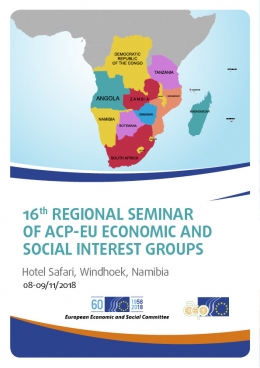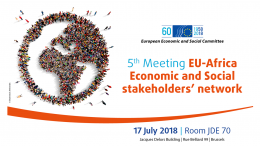European Economic
and Social Committee
AKP und Afrika
Vom ersten Abkommen von Lomé (1975) bis zum Cotonou-Abkommen (2000-2021) prägten EU-AKP-Partnerschaften die Beziehungen zwischen der EU und 79 Ländern Afrikas, der Karibik und des pazifischen Raums (AKP-Staaten), die vor kurzem zur Organisation afrikanischer, karibischer und pazifischer Staaten (OAKPS) geworden sind.
In diesem gesamten Zeitraum setzte sich der EWSA gemeinsam mit der Zivilgesellschaft der AKP-Staaten für die Anerkennung der grundlegenden Rolle nichtstaatlicher Akteure im Entwicklungsprozess ein, bis dies mit dem Cotonou-Abkommen erreicht wurde, in dem der EWSA beauftragt wurde, Aktivitäten und Konsultationen mit „wirtschaftlichen und sozialen Interessengruppen AKP-EU“ zu organisieren, um die Ansichten der organisierten Zivilgesellschaft einzuholen und ihr eine Stimme zu verleihen. Ziel war die Förderung des Austauschs und die Abgabe von Empfehlungen zu für die AKP-EU-Beziehungen relevanten Fragen bzw. politischen Maßnahmen, die später offiziell den Staats- und Regierungschefs der EU und der AKP-Staaten übermittelt wurden.
In der Praxis werden die Tätigkeiten des EWSA im Zusammenhang mit den Beziehungen zwischen der EU und der OAKPS hauptsächlich unter der Leitung eines inklusiven Begleitausschusses AKP-EU durchgeführt, dem EWSA-Mitglieder und Delegierte – Vertreter wirtschaftlicher und sozialer Interessengruppen in den AKP-Staaten – angehören.
Der Begleitausschuss EU-AKP unterhält auf verschiedenen Ebenen ständige Beziehungen mit den Vertretern der Zivilgesellschaft in den AKP-Staaten, namentlich durch:
- regelmäßige Treffen des Begleitausschusses EU-AKP,
- regionale Seminare in AKP-Staaten, die ein Forum für Debatten mit Vertretern der Zivilgesellschaft in wechselnden Regionen über Themen von gemeinsamem Interesse bieten,
- allgemeine Treffen der wirtschaftlichen und sozialen Interessengruppen der AKP-Staaten und der EU, die alle drei Jahre in Brüssel stattfinden.
Der EWSA steht zudem in regelmäßigem Kontakt mit Vertretern der wirtschaftlichen und sozialen Interessengruppen der Afrikanischen Union im Rahmen der Gemeinsamen Strategie EU-Afrika. Insbesondere hält der EWSA jährliche Treffen mit dem Netz der wirtschaftlichen und sozialen Akteure der EU und Afrikas ab.
Darüber hinaus unterhält der EWSA seit vielen Jahren regelmäßige Beziehungen zu der Paritätischen Parlamentarischen Versammlung AKP-EU und stellt in den Sitzungen der Versammlung einen Bericht zu seinen Tätigkeiten vor.
Außerdem steht der EWSA in engem Kontakt zu internationalen Arbeitgeber-, Arbeitnehmer-, Landwirtschafts-, Genossenschafts- und Verbraucherorganisationen. Diese Organisationen nominieren die AKP-Vertreter, die zu den vom EWSA veranstalteten Sitzungen eingeladen werden, darunter auch zu jenen des Begleitausschusses EU-AKP.








